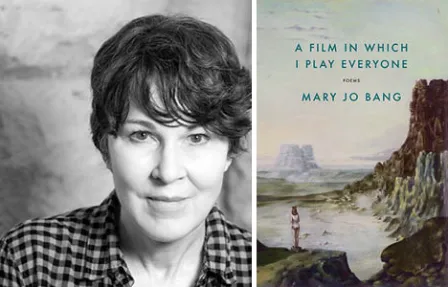 Mary Jo Bang
Mary Jo Bang
Professor
Department of English

A Film in Which I Play Everyone: Poems (Graywolf Press)
Funding/support: Sabbatical leave
Research sites
All research was done online. It resulted in quotes (or paraphrases) by David Bowie, Shakespeare, Marsden Hartley (the painter), Mary Shelley, James Joyce, Thomas De Quincy (Confessions of an English Opium-Eater), Roland Barthes, Emily Dickinson, Dante, Virgil, Charles Lamb, Lewis Carroll and myriad others who live on the internet.
Years: 7 years
“I’ve always wanted to find a place in a poem for Shakespeare’s stage direction in The Winter’s Tale: “Exit, pursued by a bear”! I failed to find room for that in this collection, but I did find a way — in “The Doctor’s Monster is Downing” — to incorporate another favorite Shakespeare moment, this one from The Tempest: “The watch-dogs bark! Bow, wow.”
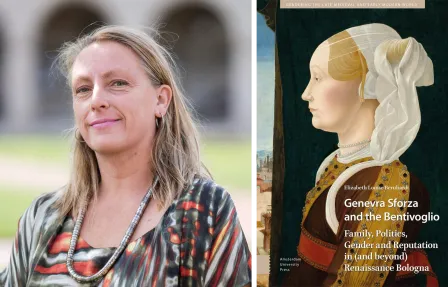 Elizabeth Bernhardt
Elizabeth Bernhardt
Lecturer in Italian and French
Department of Romance Languages and Literatures

Genevra Sforza and the Bentivoglio (Amsterdam University Press)
Funding
Saint Louis University publishing subvention
Washington University publishing subvention
Research sites
Biblioteca Comunale “L'Archiginnasio” a Bologna, Biblioteca Universitaria a Bologna, Archivio di Stato di Bologna, Archivio Arcivescovile a Bologna, Archivio di Stato di Mantova, Archivio di Stato di Firenze, Archivio di Stato di Milano, Archivio di Stato di Ferrara, Archivio di Stato di Faenza, Archivio di Stato di Modena, Archivio di Stato di Pesaro, Archivio di Stato di Parma, Archivio di Stato di Rimini, Archivio di Stato di Venezia, Biblioteca Gambalunga a Rimini, Biblioteca Ariostea a Ferrara, Archivio Storico Comunale di Carpi, Biblioteca Medicea Laurenziana a Firenze, Biblioteca Marciana a Venezia, Biblioteca Ambrosiana a Milano, Biblioteca Estense a Modena, Biblioteca Comunale di Mirandola, Biblioteca della Curia Arcivescovile di Pesaro, Biblioteca Oliveriana a Pesaro, Biblioteca Palatina a Parma, Archivio Rangoni a Spilamberto, Biblioteca Comunale Cionini a Sassuolo, et al.
Years
Many! The core of the book stemmed from my PhD dissertation completed thanks to generous funding from the University of Toronto (research began in 2000, and my PhD was completed in 2007 — although I did have a baby in 2004 that took plenty of time away from the project). Most of the years since then (and until 2019) I continued to live in Italy where I continued to conduct research/collect archival information and details for the book in my spare time. Then much of the book came together in St. Louis thanks to having had more free time to work on it here (thanks to the Covid situation) up until its publication in February 2023.
“The story of Genevra Sforza is an important one — yet a challenging one to research since her traces were left spread thin in masses of 15th-century papers dispersed across Italy. The difficulties present in uncovering her life story in those such materials explains why nobody had studied her. The project demanded an element of continual travel that would have cost a small fortune; so in order to conduct the necessary research, I remember having had to board many trains without a ticket — so it is also thanks to the Ferrovia dello Stato Italiane that unknowingly helped sponsor this 15th-century history project.”
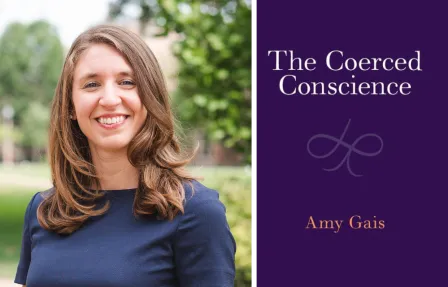 Amy Gais
Amy Gais
Lecturer
Department of Political Science and Interdisciplinary Project in the Humanities

The Coerced Conscience (Cambridge University Press)
Fellowships and funding
Beinecke Rare Books & Manuscript Dissertation Fellowship (New Haven, CT, Yale)
Mellon Modeling Interdisciplinary Inquiry Postdoctoral Fellowship (St. Louis, WashU)
IPH Book Manuscript Workshop (St. Louis, WashU)
Years
Nearly a decade if you count the dissertation years! 2015–18, I wrote the dissertation. 2018–20, I revised the dissertation into a book. 2020–24, I submitted the manuscript to CUP, waited for reviewer reports, made final revisions and send it to the press to print! This final stage was much longer than usual in light of COVID-19 delays and obstacles.
“This is my first book, so not only did I hone my research expertise, but I learned about the process of writing a book. First, you start with your butt in the chair, getting words down onto the page, and messy first drafts. Then, revise, revise, revise. Then sharpen a rough manuscript into a more polished final product. I am already underway on my second book, which has been much easier and exciting given all that I have learned about the process of writing a book from this first project.”
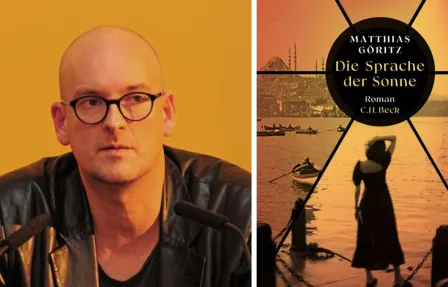 Matthias Göritz
Matthias Göritz
Professor of Practice of Comparative Literature
Program in Comparative Literature

Die Sprache der Sonne (C.H. Beck)
“My novel Die Sprache der Sonne deftly shifts perspectives between present-day Istanbul, where an American journalist looks for traces of her deceased German-Jewish grandmother, and the 1930s, when Istanbul was a haven for German-Jewish intellectuals. A generous grant by Tarabya Cultural Academy in Istanbul, an institution of the German Federal Government, run by the German Embassy in Ankara and the Goethe-Institut, allowed me to live in Istanbul for four consecutive summers, access several archives in Turkey and highlight the role Istanbul played in fostering German intellectual thought that was sidelined by the Nazi regime. I have worked seven years on researching and writing this book.”
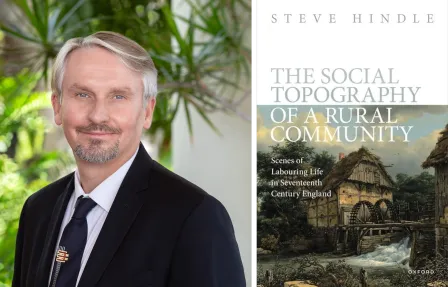 Steve Hindle
Steve Hindle
Derek Hirst Endowed Professor of Early Modern British History
Department of History

The Social Topography of a Rural Community: Scenes of Labouring Life in Seventeenth-Century England (Oxford University Press)
Fellowships
UK Arts and Humanities Research Council Research Grant 2008–09
Leverhulme Trust Major Research Fellowship 2011–13
Funding
W.M. Keck Foundation Research Chair, The Huntington Library, San Marino, Calif. 2013-22
Numerous travel grants for trips to UK archives
Research sites
Warwick County Record Office, Warwick, UK
Staffordshire County Record Office, Stafford, UK
Shakespeare Birthplace Trust Record Office, Stratford-upon-Avon, UK
The National Archives, London, UK
Huntington Library, San Marino, Calif.
Years: 17 years. The first archival work was done in 2005–06, and the first essay derived from the project was published in 2008 [this kind of research is not supposed to be quick and dirty]
“I had the great good fortune to work with an extraordinary cartographer and designer Matthew Enger who digitally reconstructed the spatial dynamics of the Warwickshire community which is the focus of the study—when I first saw his map of the occupational structure of the village I could envisage for the first time what it might have been like to live there in the late 17th century.”
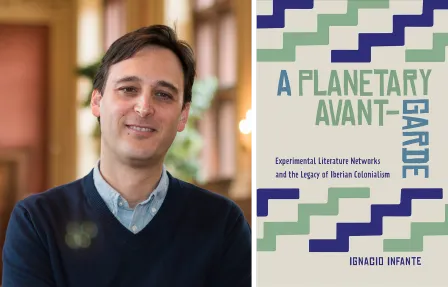 Ignacio Infante
Ignacio Infante
Associate Professor
Program in Comparative Literature and Department of Romance Languages and Literatures

A Planetary Avant-Garde: Experimental Literature Networks and the Legacy of Iberian Colonialism (University of Toronto Press)
Funding
The research leading up to this book was supported by a Maxwell C. Weiner Research Fellowship and a Summer Faculty Research Grant from the Center for the Humanities.
Research sites
Many great libraries (national/international): Biblioteca de Andalucía, Biblioteca Nacional de España, Library of the Getty Research Institute, Los Angeles Public Library, UCLA Libraries, New York Public Library. In addition, of course, I am grateful to everyone at Washington University Libraries for all their generous archival support and excellent research resources.
Years
From conceptual development of the project, to carrying out all research, and finally to manuscript completion and book production, I worked on the book for about eight years.
“Being able to work with the University of Toronto Press was a wonderful experience, and seeing for the first time their final design for the book cover was one of the most exciting moments of the years I worked on the book!”
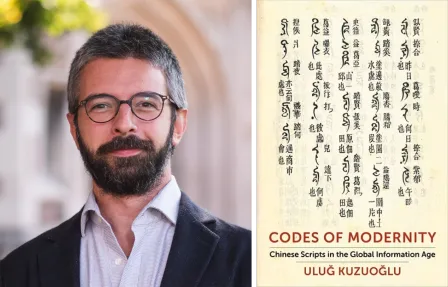 Uluğ Kuzuoğlu
Uluğ Kuzuoğlu
Assistant Professor of History
Department of History

Codes of Modernity: Chinese Scripts in the Global Information Age (Columbia University Press)
Fellowships
Social Science Research Council, American Council of Learned Societies
Other funding
Center for Chinese Studies, Harriman Russian Studies Research Grant, Weatherhead East Asia Institute Grants, Chinese Government Scholarship.
List of research sites
Beijing, Shanghai, Nanjing, Taipei, Moscow, St. Petersburg, Istanbul, New York
Years
The work for this book began in 2013, a couple of years after I started graduate school. It took five years to complete the dissertation, and another five years to hold in my hands a copy of the book.
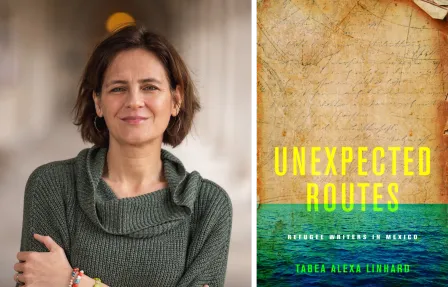 Tabea Linhard
Tabea Linhard
Professor of Spanish and of Comparative Literature
Department of Romance Languages and Literatures

Unexpected Routes: Refugee Writers in Mexico (Stanford University Press)
Fellowships
ACLS Fellowship, Center for the Humanities Faculty Fellowship
Funding
Several Faculty Research Grants and Weiner Grant from the Center for the Humanities
Research sites
Anna Seghers Stiftung, (Berlin, Germany)
Library of the Iberoamerikanisches Institute, IAI, (Berlin, Germany)
Akademie der Künste, Archiv und Bibliothek (Berlin, Germany)
Folkwang Museum (Essen, Germany)
Asociación Cultural Na Bolom (San Cristobal de las Casas, Chiapas, Mexico)
And numerous desks, coffee shops, and park benches in St. Louis, Berlin and Barcelona
Years: 9 years
“The book became what it is because all along I was thinking about how to place emotions on a map, which then led me to re-read the sources and compose the book in a certain way. This may sound like the old ‘the journey is the destination’ cliché — but even that one may be an interesting one to map.”
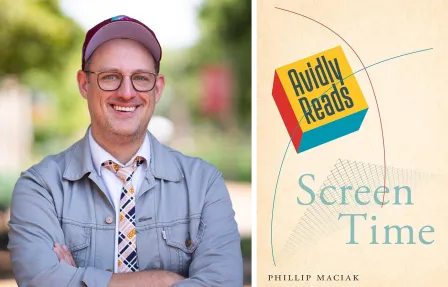 Philip Maciak
Philip Maciak
Senior Lecturer
Department of English and Program in American Culture Studies

Avidly Reads Screen Time (New York University Press)
“I chose to write this book for NYU’s ‘Avidly Reads’ trade paperback series specifically so that I could work with series editor Sarah Mesle, who’s been a close collaborator and friend for nearly 10 years. As teaching-track faculty, I’m ineligible for most internal research and writing support, so, over the course of a year and a half, I wrote Screen Time the same way I write my column for The New Republic and the same way I do all my writing and editing: in between lesson plans, late at night and in stolen moments over the summer.”
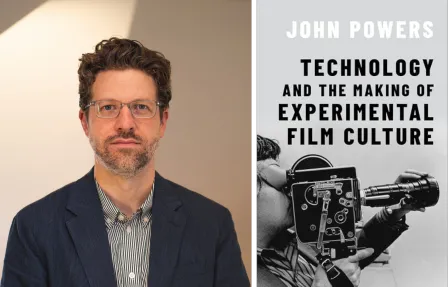 John Powers
John Powers
Assistant Professor
Program in Film and Media Studies

Technology and the Making of Experimental Film Culture (Oxford University Press)
Research sites
Stanford University, University of Colorado Boulder, Film-Makers' Cooperative (NYC)
Years: 14 years
“It took a long time to write and multiple versions to get right, but I loved working on it (most of the time)!”
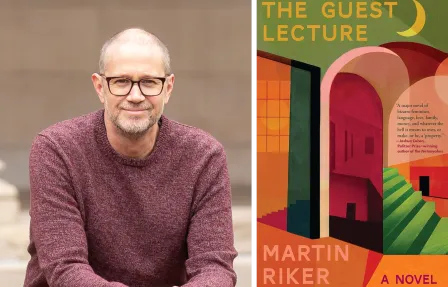 Martin Riker
Martin Riker
Teaching Professor in English
Department of English

The Guest Lecture (Grove Atlantic)
“The Guest Lecture was started around the time my first novel was coming out, which was a hectic time, as are all times always. Fortunately, I had a wonderfully practical premise. It’s a book about an academic economist up all night in a dark hotel room worrying about her life. The whole novel takes place in her head, in fact she tries to not even move, so as not to wake her family sleeping around her. All novels are works of the imagination, of course, but this one actually takes place in the imagination, particularly in the world of insomnia, which was very convenient, since I also have insomnia (or did at the time, anyway), and the novel gave me something productive to work on while I lay there awake. Sleeplessness was no longer annoying, but research.”
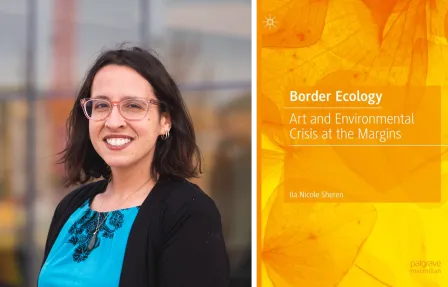 Ila Sheren
Ila Sheren
Associate Professor
Department of Art History and Archaeology

Border Ecology: Art and Environmental Crisis at the Margins (SpringerLink)
This book was conceived of initially during a Mellon Postdoctoral Fellowship at the University of Toronto’s Jackman Humanities Institute, but it took shape with the funding and support of a year in residence at the University of Minnesota’s Institute for Advanced Study.
The Center for the Humanities provided funding for summer research and grant proposal writing, and I received funding from the Department of Art History & Archaeology for travel and other related expenses.
This was a project that dealt with digital media, as such, site-specific research wasn’t as critical as in previous projects. I did make trips to New York City to view artworks and was able to participate in convenings in the Twin Cities when I was in residence there. St. Louis factors heavily into the final chapter, and it was a real eye-opener to spend time in our local landscape.
The writing lasted from 2015 through 2019. I had been working on it in some form since 2012, however.
The manuscript was finished and under advance contract in spring of 2020 but we all know what happened (cue sad trombone). It was a labor of love to get it published in 2023, but I’m glad it found a home!
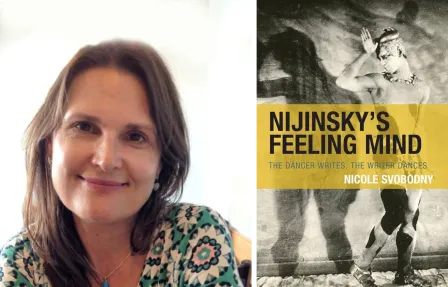 Nicole Svobodny
Nicole Svobodny
Senior Lecturer
Program in Global Studies

Nijinsky's Feeling Mind: The Dancer Writes, the Writer Dances (Lexington Books)
Funding
A 2019 Summer Stipend from the National Endowment for the Humanities (awarded as independent scholar) allowed me to do archival research in Europe and spend time writing. I used my Global Studies research funds to conduct initial research at NYPL; funding from GS covered additional production and promotion costs.
Research sites
New York Public Library for Performing Arts, Jerome Robbins Dance Division; La Bibliothèque nationale de France, Richelieu-Musique (Paris); Foundation John Neumeier (Hamburg); a private collection of correspondence and dance notation (Munich). Also, digital archives for French, Russian, and U.S. newspapers, magazines and address directories.
Years
5-10 years. I actually began writing this book when I presented a draft chapter of it at the Dance Studies Seminar at Columbia University in 2018. I’d been working on aspects of this project, on and off, since 2013, but I wasn’t sure any of it was building up to a book … until I presented “Chapter One” (now the kernel of my fifth chapter) at that seminar. In retrospect, though, I could even say that this project has been in the background of my entire adult life in that so many of my disparate interests (obsessions?) converged while writing it. Along the way, I also delved into dance theory, animal studies and the history of psychology, among other new areas for me.
“I completely immersed myself in the year 1919. It was fascinating to trace many of today’s issues back to that time. In terms of sheer archival delight, I enjoyed discovering Nijinsky’s verbal descriptions in his unpublished dance notation, like this one: ‘Stands in the Yard. Snowing.’”
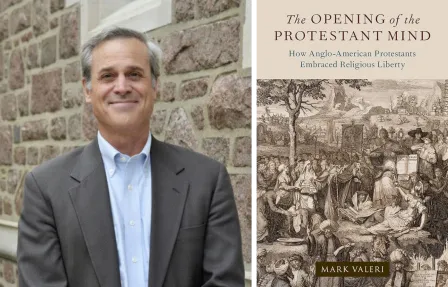 Mark Valeri
Mark Valeri
Reverend Priscilla Wood Neaves Distinguished Professor of Religion and Politics
John C. Danforth Center on Religion and Politics

The Opening of the Protestant Mind: How Anglo-American Protestants Embraced Religious Liberty (Oxford University Press)
Fellowships
The Los Angeles Times Distinguished Fellowship in the History and Culture of the Americas at the Huntington Library, San Marino, California
Funding
Research funds from the John C. Danforth Center on Religion and Politics
Research sites
Huntington Library, Library Company of Philadelphia, Massachusetts Historical Society, British Museum
Years: 12 years
“Part of the project was sparked by the discovery of a deck of playing cards produced in 1670 in London, and held at the Huntington. The cards had descriptions of the world’s religions with fantastic drawings of people from different parts of the world: 4 continents (suits), with 48 different countries.”
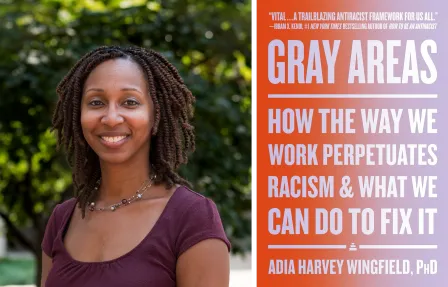 Adia Wingfield
Adia Wingfield
Mary Tileston Hemenway Professor in Arts & Sciences
Department of Sociology

Gray Areas: How the Way We Work Perpetuates Racism and What We Can Do to Fix It (HarperCollins)
Years
The writing process took about a year and a half, but is based on data collected over the course of my career.
“I started working on this book in 2020, which was not the best time to take on a new project. But it was a great opportunity to highlight the ways racial inequality continues to shape and structure our workplaces.”
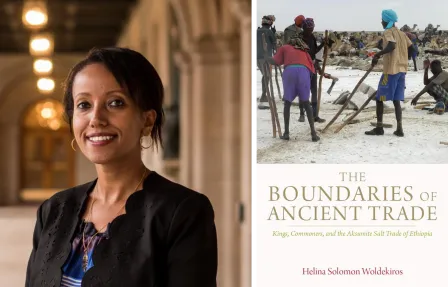 Helina Woldekiros
Helina Woldekiros
Assistant Professor
Department of Anthropology

The Boundaries of Ancient Trade: Kings, Commoners, and the Aksumite Salt Trade of Ethiopia (University Press of Colorado)
Fellowships
Fulbright-Hays, The Wenner-Gren Foundation, National Science Foundation, American Association of University Women Fellowship Grant
Funding
Department of Anthropology, Washington University in St. Louis, research grant
Research sites
North Ethiopian Highlands, Ethiopia
Afar Desert, Danakil Depression, Ethiopia
Years: 6 years (not including fieldwork years)
“Initiating the writing journey of my book entailed traversing the scorching Afar desert, one of the harshest places on Earth. In this challenging terrain, blocks of salt were intricately fastened to camels and donkeys, enduring hundreds of miles along a trade route forged by thousands of caravaners for nearly two millennia. Similar to the resilience displayed by these hardworking caravaners, crafting my first book proved to be a demanding yet gratifying expedition, affording me the privilege to narrate the remarkable tale of those whose toil contributed to shaping an empire.”
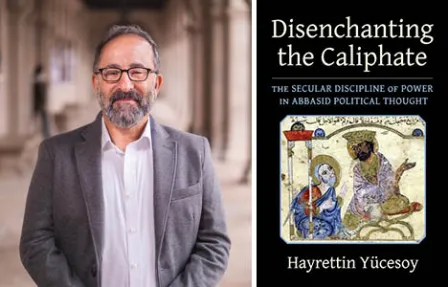
Hayrettin Yücesoy
Associate Professor of Middle Eastern History
Department of Jewish, Islamic, and Middle Eastern Studies
Disenchanting the Caliphate: The Secular Discipline of Power in Abbasid Political Thought (Columbia University Press)
Fellowships
Residential fellowships at Boğaziçi University, Istanbul; American University of Beirut, Lebanon; King Faisal Center for Research in islamic Studies, Riyad
Funding/support
Multiple grants from the Center for the Humanities, Washington University
Sabbatical, course release
TUBITAK, Turkish Governmental Funding Agency
Research sites
Libraries in Istanbul, Cairo, Rabat, Riyadh, Beirut, Amman, Chicago
Years: 6–7 years
“Crafting a book in the humanities is a formidable undertaking, akin to navigating a stormy sea sometimes without sight of land, marked by myriad emotional peaks and valleys. It is also a humbling journey as it puts you directly eye to eye with great minds through their writing, analysis and insight.”